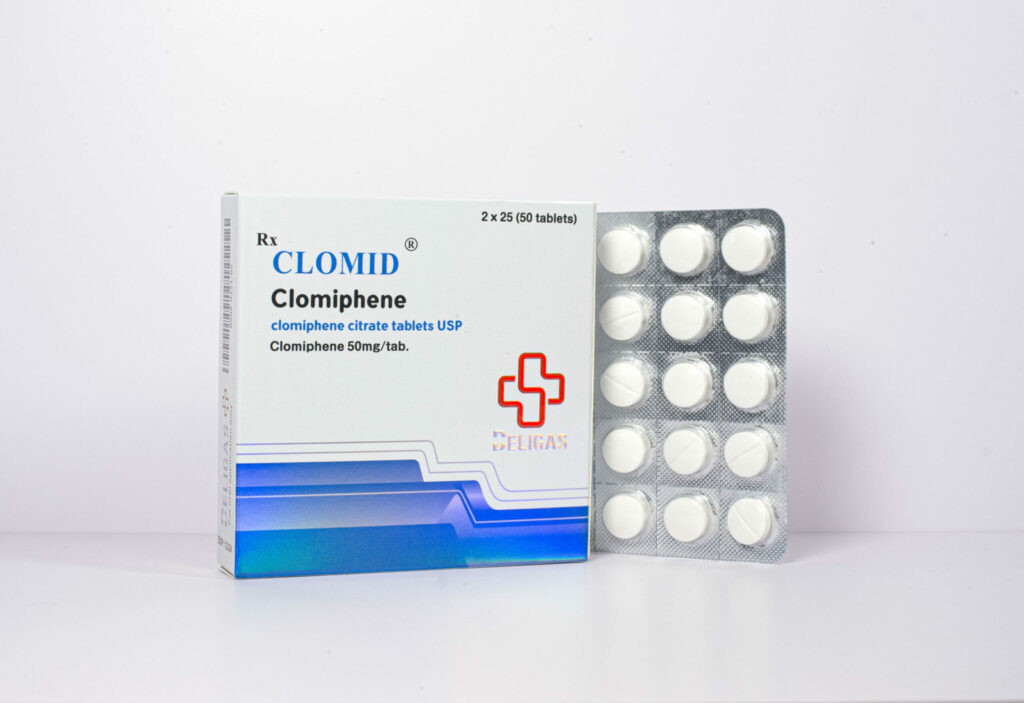Discover how Clomid can help improve male fertility.
The Benefits of Clomid for Men
Male infertility is a complex issue that can have a significant impact on a couple’s ability to conceive. One potential solution that has gained attention in recent years is Clomid. In this article, we will explore the benefits of Clomid for men and shed light on how it works, its role in boosting testosterone levels and sperm production, potential side effects, the process of taking Clomid, and its success rates.
Understanding Clomid: A Brief Overview

Before delving into the benefits of Clomid for male fertility, it’s important to have a basic understanding of what Clomid is. Clomid, also known as clomiphene citrate, is a medication primarily prescribed for women with ovulation disorders. However, it can also be used off-label as a treatment for male infertility.
Clomid belongs to a class of medications called selective estrogen receptor modulators (SERMs). SERMs like Clomid work by blocking the effects of estrogen in the body. This is crucial in both women and men, as estrogen can have inhibitory effects on the production of hormones necessary for fertility.
What is Clomid?
Clomid works by stimulating the production of certain hormones that are essential for ovulation. In men, it acts by increasing the production of luteinizing hormone (LH) and follicle-stimulating hormone (FSH), which in turn stimulate the testes to produce more testosterone and improve sperm production.
It’s important to note that Clomid is not a hormone itself, but rather a medication that indirectly influences hormone production. By targeting the hypothalamus and pituitary gland, Clomid helps to restore the balance of hormones involved in the reproductive process.
How Does Clomid Work?
Clomid works by binding to estrogen receptors in the hypothalamus, a region of the brain that plays a crucial role in regulating hormone levels. By blocking these receptors, Clomid inhibits negative feedback signals sent by estrogen, leading to increased secretion of LH and FSH. This process ultimately results in elevated testosterone levels and improved sperm production and sperm motility.
Furthermore, Clomid is often prescribed in combination with other fertility treatments to enhance its effectiveness. This comprehensive approach aims to address various factors that may be contributing to male infertility, offering a more holistic solution for couples seeking to conceive.
The Role of Clomid in Male Fertility
Now that we understand how Clomid works, let’s explore its role in male fertility.
Male fertility is a complex interplay of various factors, and Clomid, a medication commonly associated with female fertility treatments, has also shown promising results in improving male fertility. Beyond its well-known use in treating female infertility, Clomid has been increasingly prescribed to men experiencing fertility issues.
Clomid and Testosterone Levels
Testosterone is a hormone that is vital for male reproductive health. Low testosterone levels can adversely affect sperm production and overall fertility. Clomid can help boost testosterone levels by stimulating the testes to produce more of this hormone. Increased testosterone levels can enhance sperm quality and motility, increasing the chances of successful fertilization.

Furthermore, the impact of Clomid on testosterone levels extends beyond just fertility. Adequate testosterone levels are crucial for various aspects of male health, including muscle mass, bone density, and overall well-being. By aiding in testosterone production, Clomid not only supports fertility but also contributes to overall male hormonal balance.
Clomid’s Impact on Sperm Production
In addition to increasing testosterone levels, Clomid has been shown to improve sperm production in men with low sperm counts or abnormal sperm parameters. By increasing the production of LH and FSH, Clomid helps the testes produce more sperm, thereby improving male fertility.
Optimal sperm production is essential for successful conception, and Clomid’s ability to enhance this process offers new possibilities for couples struggling with male factor infertility. The precise mechanisms through which Clomid influences sperm production are still being studied, but its potential to address various sperm abnormalities provides hope for many men seeking to become fathers.
Potential Side Effects of Clomid
While Clomid can offer significant benefits for male fertility, it’s important to be aware of potential side effects.
Clomid, also known as clomiphene citrate, is a medication commonly prescribed to stimulate ovulation in women struggling with infertility. However, it is also used off-label to treat male infertility by increasing testosterone levels. This can help improve sperm production and quality, aiding in the process of conception.
Physical Side Effects
Some individuals may experience physical side effects when taking Clomid. These can include hot flashes, headaches, nausea, and fatigue. These symptoms are usually mild and temporary, subsiding once the medication is discontinued.
In addition to these common physical side effects, some individuals may also experience visual disturbances while taking Clomid. These can manifest as blurred vision or seeing spots or flashes of light. It is important to report any changes in vision to your healthcare provider immediately to prevent any potential complications.
Psychological Side Effects
In rare cases, Clomid can cause psychological side effects, such as mood swings, depression, and irritability. If you experience any concerning changes in mood while taking Clomid, it’s important to consult your healthcare provider.

It is crucial to monitor your mental health while on Clomid, especially if you have a history of mood disorders. Some individuals may also report anxiety or nervousness as a result of taking this medication. Open communication with your healthcare provider is key to addressing any psychological side effects and ensuring your well-being throughout the treatment process.
The Process of Taking Clomid for Male Fertility
If you and your healthcare provider determine that Clomid is a suitable treatment option for your male infertility, the following steps are typically involved:
Initial Consultation and Diagnosis
The first step is to consult with a fertility specialist who will assess your medical history, perform a physical examination, and conduct fertility tests. These tests may include semen analysis, hormone level testing, and ultrasound evaluation. Based on the results, the doctor will diagnose the underlying cause of infertility and determine whether Clomid is an appropriate treatment option.
During the initial consultation, it is crucial to provide detailed information about any past medical conditions, medications, or lifestyle factors that could be contributing to male infertility. This comprehensive evaluation helps the fertility specialist tailor the treatment plan to your specific needs and circumstances.
Treatment Plan and Dosage
If Clomid is deemed suitable for your case, the doctor will develop a treatment plan and prescribe the appropriate dosage. The typical starting dosage is usually 25mg to 50mg per day, taken for a duration of three to six months. The dosage may be adjusted based on individual response and hormone levels.
It is essential to follow the prescribed dosage and schedule meticulously to optimize the effectiveness of Clomid therapy. Regular follow-up appointments with your fertility specialist will allow for monitoring of treatment progress, assessment of side effects, and adjustments to the dosage if needed. Open communication with your healthcare provider is key to ensuring the best possible outcome from Clomid treatment for male fertility.
The Success Rate of Clomid in Treating Male Infertility
Now, let’s delve deeper into the success rate of Clomid in treating male infertility.
Understanding Success Rates
It’s essential to understand that the success rate of Clomid can vary significantly based on a multitude of factors. These factors include the specific cause of infertility, the individual’s unique response to the medication, and how strictly the treatment protocols are followed. While some studies have shown promising results in terms of increased sperm count and motility, the overall effectiveness of Clomid therapy for male infertility is still being researched, and there is a need for further studies to establish a concrete success rate.
Factors Influencing Success Rates
Various factors play a crucial role in determining the success rate of Clomid therapy for male infertility. The severity of the underlying fertility issue, the duration of treatment, overall health and wellness, as well as lifestyle choices like diet and exercise, can all impact the outcome of the treatment. To maximize the chances of success, it is vital to collaborate closely with your healthcare provider and diligently adhere to the prescribed treatment plan.
Moreover, it’s worth noting that individual responses to Clomid can vary, and what works well for one person may not yield the same results for another. Patience and consistent communication with your healthcare team are key as you navigate the journey of using Clomid to address male infertility. By staying informed, proactive, and committed to the treatment process, you can optimize your chances of achieving a positive outcome.
Conclusion
Clomid has shown promise as a treatment option for male infertility, with the potential to improve testosterone levels and sperm production. However, it’s important to weigh the benefits against potential side effects and consider individual factors that may influence treatment success. If you’re struggling with male infertility, consulting with a fertility specialist can help you explore the options available and make an informed decision. Remember, everyone’s journey is unique, and finding the right path to parenthood requires personalized care and support.